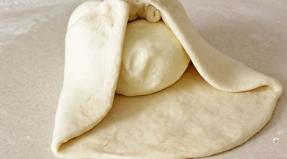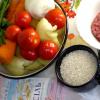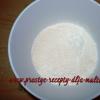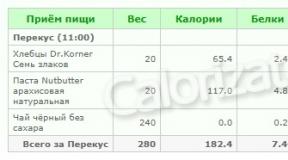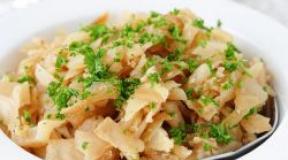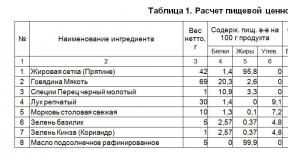Nutritional value of chicken eggs. The ratio of proteins, fats and carbohydrates in eggs
Chicken eggs are in the diet of every person, because they are rich in elements useful for our body and can be a wonderful breakfast, lunch or dinner. But at the same time, their use in large quantities can negatively affect health, and if we are talking about losing weight, then the daily rate decreases even more. Eggs are a product that is healthy as long as it is consumed correctly, but if you break even one rule, the result will not be as good as expected. To understand how and how much of them there is, you need to know how much BJU is in a chicken egg, what is its calorie content and what elements it is rich in.
BJU, calorie content of eggs
A medium-sized egg weighs about 55-60 g and contains about 70 calories. The protein accounts for 60% of the entire mass of the egg, the yolk - 30%, and 10% is the shell. BJU raw chicken eggs are as follows:
- Protein - 12 grams.
- Fat - 11 grams.
- Carbohydrates - 1 gram.
The calorie content and BJU of a chicken egg may be different depending on how it is cooked. There are many methods for preparing eggs, and each of them affects the ratio of elements in its own way. For example, BJU boiled chicken eggs and its calorie content do not differ much from the same indicators in their raw form, but it is worth breaking it into a frying pan with butter, and the situation will change dramatically.
The calorie content of an egg can also be affected by what the chicken eats. If the bird had the opportunity, in addition to using special feed, to walk around a large area and find various grains or larvae, then the egg will have a higher calorie content in comparison with that obtained at the poultry farm. Eggs from domestic hens are valued more not only in terms of their nutrient content, but also in terms of their benefits to the body.
There is a myth that eggs should be consumed exclusively white, because if a brown or brown hen's egg, BJU and its calorie content differ significantly. In fact, the color of the egg does not in any way affect the indicators of the substances in it.
Eggs are one of the most unique foods on the planet, because they are absorbed by the human body by 98%. And even if there are cases of allergies, this does not change its nutritional value. Chicken eggs do not harm the body and are completely excreted, at the same time saturating it with useful elements.
Chicken egg white: BJU
Chicken protein contains 87% water, 11% proteins, 1% carbohydrates and 1% minerals. BJU chicken eggs without yolk are much less. This is what makes it an incredibly valuable source of low-calorie protein. Calorie content and BZHU of medium-sized chicken eggs excluding yolk:
- Kilocalories (per 100 g) - 52.
- Protein - 11 grams.
- Fats - 0.
- Carbohydrates - 0.

There are the correct proportions of essential amino acids, including methionine, which the human body cannot produce. It is methionine that plays an important role in the synthesis of creatine, adrenaline, promotes the active action of vitamins and enzymes. Moreover, if there is an insufficient amount of methionine in the body and there are problems in the functioning of the nervous system.
BJU yolk
Chicken yolk consists of 50% water, 32% is fats, 16% is proteins, and 2% is spent on minerals. Kilocalories in the yolk of a medium-sized chicken egg are about 50-55; per 100 grams - 350 calories.
BJU chicken eggs without protein:
- Proteins - 16 g.
- Fat - 31 g.
- Carbohydrates - 1 g.

The great value of the yolk is that it contains a whole complex of fatty acids, which have a positive effect on the functioning of the whole organism. But many people eat eggs on the principle of "protein in a plate, yolk in a trash bin" due to the fact that there is a lot of cholesterol in the yolk. Yes, yolk is really rich in cholesterol, but it is also necessary for the human body. For example, if the body has low cholesterol levels, the liver begins to produce it on its own. Eating egg yolk in moderation will not harm your health. In addition, in addition to cholesterol, the yolk of a chicken egg contains many useful substances, such as lecithin, which promotes brain activity and prevents the development of sclerosis, or which activates metabolism.
Useful micronutrients in a chicken egg
Chicken eggs are not only a high product, but also a source of a large number of beneficial bioregulators, minerals and proteins. What exactly does a chicken egg contain and how does its use affect human health?

- Niacin, or vitamin B3, is necessary for the nutrition of cells, promotes the production of sex hormones.
- Choline, or vitamin B4, improves memory, activates the process of cleansing the liver from poisons.
- Vitamin D - Important for maintaining phosphorus and calcium levels in the body. Eggs rank second on the list of vitamin D-rich foods, second only to fish oil.
- Vitamin K is essential for normal blood clotting.
- Vitamin E and iron - actively fight bad mood and fatigue, are necessary to prevent cardiovascular diseases.
- Vitamin A - enhances immunity, has a positive effect on growth and vision.
- Vitamin E - counteracts the development of certain forms of cancer and makes eggs a kind of "elixir of youth", because this vitamin preserves natural beauty and prevents the body from aging.
- Vitamin B12 - has a beneficial effect on blood formation and is a way to prevent nervous diseases. One egg satisfies 100% of the daily requirement for vitamin B12.
And this is only a small part, because chicken eggs are rich in calcium, manganese, selenium, folacin, sodium, zinc, biotin and folic acid, it contains almost all vitamins (with the exception of vitamin C), essential amino acids.
Chicken eggs for weight loss
In the diet of a person who follows medical nutrition or diet for weight loss, eggs must be present. BJU chicken eggs and their calorie content prove that this product is one of the lowest in calories, but at the same time nutritious in the world. Its use normalizes metabolism. Two eggs for breakfast make the daily ration 400 kilocalories less, while they perfectly saturate the body for the whole day.

The yolk is much higher in calories than protein, so it is often thrown away, and with it a whole range of useful microelements and vitamins.
Indicators of BJU chicken eggs without yolk fall, and the diet becomes less high-calorie, but in this case there is no question of nutritional value. The yolk should also be in the diet, like the protein, but in smaller quantities. When losing weight, it is recommended to consume no more than two yolks a day. In this case, protein can be eaten in unlimited quantities. That is, eating two steeply boiled chicken eggs with tomato and cheese for breakfast, you can afford an egg white omelet with salad for dinner. The variety of egg preparation methods is impressive, which once again proves the value of this product.
How to cook a chicken egg correctly
BZHU, the calorie content of boiled eggs is equal to the corresponding indicators in raw. And this is a big plus, since many people cannot eat raw eggs, but boiled ones have much better taste, while fully retaining all the benefits for the body.
Before boiling eggs, take them out of the refrigerator and leave them at room temperature. This is done so that when they get into boiling water, they do not burst. Then they should be rinsed - and you can cook. The cooking time depends on what kind of egg you want to get as a result: soft-boiled - 1-3 minutes, "in a bag" - 4-5 minutes, hard-boiled - 7-8 minutes. In this case, you need to expect that large eggs will cook longer, which means that they should be pulled out last. If the eggs have been boiled for more than 10 minutes, they will be overcooked, which means that the yolk will lose its taste and become covered with a greenish coating, and the protein will look like rubber.

To preserve all the fatty acids that are in the yolk, the eggs need to be boiled as follows: put them in boiling water and after 1 minute turn off the gas without removing them for another 5 minutes. As a result, the protein will have time to cook, and the yolk will remain liquid.
Boiling is the best way to prepare eggs while maintaining their nutritional value. When frying, egg white does not retain its structure, and due to the use of oil, carcinogens enter the body, which strike the liver and the digestive system.
Potential harm to chicken eggs. Cholesterol
Many people refuse to eat eggs because of their cholesterol content. But how great is its harm to the body and whether it is at all - a question without a final answer.

One egg contains just over 200 milligrams of this substance. Cholesterol in the blood is usually divided into two categories: "good" (increases the level and "bad" (increases the level of low density lipoproteins, LDL). It was found that dietary cholesterol increases the level of both "bad" and "good" cholesterol. Action " bad "is associated with saturated fats, of which there are few in the composition of eggs, which means that there will be no significant increase in such cholesterol after eating them.
The daily intake of cholesterol is 300 milligrams, which means that one egg a day will not harm your health. But those who are prone to cardiovascular diseases and diabetes should eat eggs less often - at least every other day.
Bacteria
If cholesterol is not such a terrible phenomenon in a chicken egg, then the possibility of swallowing salmonella with this product is really terrifying. Through the shell, it can enter the egg at different stages of the formation and use of this product. Salmonella causes real harm to the body, but there are ways to protect yourself from this:
- Do not eat eggs that have been cooked for less than 5 minutes.
- Do not wash eggs before placing them in the refrigerator, so as not to remove the protective film, without which the risk of Salmonella entering the egg increases. This should be done just before cooking.
- Throw away eggs with cracked shells and do not store them for long periods in the refrigerator.
Allergic reaction
Allergies are most common in children. Egg white intolerance is common, but fortunately, most children get rid of it by the age of five. Symptoms include nausea, vomiting, nasal congestion, itching, dizziness, fainting, and in some cases anaphylactic shock.
People who are allergic to egg white should take a close look at the ingredients in foods, as eggs are one of the most used ingredients in many of them. Some elements are even added to vaccine vaccines.
Eggs contain many beneficial nutrients. However, the energy value of an egg can vary depending on whether you eat the whole egg or just the protein.
This article discusses in detail what the calorie content of a boiled egg and its protein is, and also reveals whether the proteins of whole eggs are healthier or not.
Egg white is a clear, dense liquid that surrounds the bright yolk of the egg.
In a fertilized egg, the protein serves as a layer that protects the growing chick from harmful bacteria. Protein also supplies energy for its growth.
Proteins are about 10% water and 10% protein. Thus, if you remove the yolk from the egg and leave only the white, the energy value of your egg will change significantly.
The table below shows how many calories are in one egg, as well as the difference in nutrients between the protein of a large egg and a whole large egg.
| Egg white | Whole egg | |
| Calories | 16 | 71 |
| Protein | 4g | 6g |
| Fats | 0g | 5g |
| Cholesterol | 0g | 211 mg |
| Vitamin A | 0% DV | 8% DV |
| Vitamin B12 | 0% DV | 52% DV |
| Vitamin B2 | 6% DV | 12% DV |
| Vitamin B5 | 1% DV | 35% DV |
| Vitamin D | 0% DV | 21% DV |
| Folate | 0% DV | 29% DV |
| Selenium | 9% DV | 90% DV |
As you can see, protein contains fewer calories and micronutrients than one boiled egg, but it also contains less protein and fat.
CONCLUSION: the calorie content of one egg is greater than the calorie content of only its protein. At the same time, protein contains less protein, cholesterol, fats, vitamins and minerals.
Low in calories but rich in protein
In addition, this protein is of high quality, meaning it contains all 9 essential amino acids in the amounts our body needs to function best.
Thanks to the protein, eating egg whites will be beneficial for your health. Protein suppresses appetite, so after eating protein you will feel fuller longer.
Getting enough protein from your diet is essential for maintaining and gaining muscle mass, especially if your goal is weight loss.
Based on the fact that whole eggs provide slightly more protein and quite a lot of extra calories than egg whites, protein can be an excellent choice for those who want to lose weight.
CONCLUSION: The protein of one large egg contains 4g of protein and only 17 calories (less calories from a boiled egg or a whole fried egg), which makes it a good product for people who are trying to lose weight.
Egg whites are low in fat and free of cholesterol
Eggs used to be considered a rather controversial food due to their saturated fat and cholesterol content.
However, all the cholesterol and fats in an egg are in the yolk, while proteins, on the other hand, are almost entirely protein.
For many years, this has led to the assumption that egg whites are healthier than whole eggs. Now, however, research has shown that cholesterol in eggs is not a problem for most people. For only a small number of so-called "hyper-responsive" people, cholesterol intake slightly raises its blood levels.
These people have genes, such as the ApoE4 gene, that predispose them to high cholesterol levels. For such people with high cholesterol, egg white is the best option.
In addition, since there is almost no fat in the whites of eggs, they are significantly lower in calories than whole eggs. They are well suited for those who are trying to cut calories and lose weight.
CONCLUSION: Proteins are low in cholesterol and fat, so they can be used to reduce cholesterol intake and lose weight.
Risks of Eating Egg Whites
In general, proteins are a fairly safe product, but there are still some risks.
Allergy
Although eggs are not dangerous for most, an allergy to them can occur.
Most often, an allergic reaction to eggs is observed in children who outgrow it by the age of five. An egg allergy is caused by the immune system misidentifying some of the proteins in an egg as harmful to humans. Mild symptoms may include a rash, swelling, runny nose, itching, and watery eyes. There are cases of stomach upset, nausea and vomiting.
In rare cases, eggs can cause a severe allergic reaction - anaphylactic shock. It manifests itself with symptoms such as severe swelling of the throat and face and a spike in blood pressure, which together can be fatal.
Salmonella infection
Raw egg whites pose a risk of contamination of food with Salmonella bacteria ( Salmonella). Salmonella can be in the egg itself or in its shell, although modern growing and cleaning practices minimize this risk.
Cooking the egg whites to a solid state also greatly reduces the likelihood of this problem.
Reduced absorption of biotin
Raw egg whites can reduce absorption of a complex substance called biotin, which is found in various foods. It is a water-soluble vitamin that plays an important role in energy production. Crude proteins contain a protein called avidin, which binds to biotin and stops it from being absorbed.
In theory, this could be a real problem, but in reality, you need to eat a lot of raw proteins for this to lead to a biotin deficiency.
In addition, avidin in a hard-boiled or soft-boiled egg or in a fried egg does not have such a strong effect.
CONCLUSION: There are some risks in eating raw proteins, including allergies, food contamination and biotin deficiency. For most people, however, these risks are quite small.
What is there: proteins or whole eggs?

Protein is rich in protein but low in calories, low in fat and cholesterol, which helps in weight loss.
Protein can also be useful for those who need to consume a lot of protein, but also monitor the calorie intake of meals, for example, bodybuilders and athletes.
Compared to whole eggs, however, proteins are inferior to other nutrients. Whole eggs contain a variety of vitamins, minerals, additional proteins, and healthy fats.
And while eggs are high in cholesterol, recent studies have found no link between egg consumption and heart disease risk. These same analyzes have found that eating one egg a day can even reduce the likelihood of a stroke.
Moreover, the nutrients found in eggs have been cited as one of the reasons for the health benefits of eggs.
The yolks are rich in two important antioxidants, lutein and zeaxanthin, which help prevent visual impairment and cataracts. They also contain choline, which most people don't get enough of.
Eating whole eggs will help you feel fuller and eat fewer calories.
In fact, studies have shown that eating a fried or boiled egg breakfast can be beneficial for weight loss, BMI, and waist circumference.
At the same time, if you are on a very strict low-calorie diet, you have familial heart disease and high cholesterol, then egg whites may be a healthier choice for you.
Bottom line: Protein contains fewer calories than an egg, but fewer of the healthy nutrients found in yolk.
Conclusion
Egg whites are high in protein and low in calories.
For most people, however, there is little reason to choose a protein over a whole egg, as the white and yolk together provide much more nutrients.
In view of the above, people who need to restrict cholesterol and lose weight are more useful option without yolk.
Scientifically based articles from experts at Authority Nutrition.
| Product | amount | Protein | Carbohydrates | Fats | Points | Calories | |
| For more items see the branded products section. | |||||||
| Whole raw egg | 1 cup (4.86 large eggs) (243.0 g) | 30,6 | 1,9 | 24,2 | 9 | 347,5 | |
| 1 PC. very large (56.0 g) | 7 | 0,4 | 5,6 | 2,5 | 80,1 | ||
| 1 PC. huge (63.0 g) | 7,9 | 0,5 | 6,3 | 2,5 | 90,1 | ||
| 1 large (50.0 g) | 6,3 | 0,4 | 5 | 2 | 71,5 | ||
| 1 medium (44.0 g) | 5,5 | 0,3 | 4,4 | 2 | 62,9 | ||
| 1 small (38.0 g) | 4,8 | 0,3 | 3,8 | 1,5 | 54,3 | ||
| Raw egg white | 1 cup (243.0 g) | 26,5 | 1,8 | 0,4 | 3 | 126,4 | |
| 1 large (33.0 g) | 3,6 | 0,2 | 0,1 | 0,5 | 17,2 | ||
| Raw egg yolk | 1 cup (243.0 g) | 38,5 | 8,7 | 64,5 | 21,5 | 782,5 | |
| 1 large (17.0 g) | 2,7 | 0,6 | 4,5 | 1,5 | 54,7 | ||
| 1/2 lb (227.0 g) | 35,2 | 2,6 | 58,1 | 19 | 687,8 | ||
| Frozen egg yolk with sugar | 1/2 lb (227.0 g) | 31,3 | 24,5 | 51,6 | 18,5 | 696,9 | |
| Whole fried egg | 1 large (46.0 g) | 6,3 | 0,4 | 7 | 2,5 | 90,2 | |
| Hard boiled whole egg | 1 cup (136.0 g) | 17,1 | 1,5 | 14,4 | 5,5 | 210,8 | |
| 1 tbsp (8.5 g) | 1,1 | 0,1 | 0,9 | 0,5 | 13,2 | ||
| 1 PC. large (50.0 g) | 6,3 | 0,6 | 5,3 | 2 | 77,5 | ||
| One Whole Egg Omelet | 1 tbsp (15.0 g) | 1,6 | 0,1 | 1,8 | 1 | 23,6 | |
| 1 large (61.0 g) | 6,5 | 0,4 | 7,3 | 3 | 95,8 | ||
| Whole poached egg | 1 large (50.0 g) | 6,3 | 0,4 | 5 | 2 | 71 | |
| Soft-boiled egg | 1 cup (220.0 g) | 24,4 | 4,8 | 26,9 | 10 | 367,4 | |
| 1 tbsp (13.7 g) | 1,5 | 0,3 | 1,7 | 1 | 22,9 | ||
| 1 large (61.0 g) | 6,8 | 1,3 | 7,4 | 3 | 101,9 | ||
| Dry whole egg | 1 small cup (85.0 g) | 40,2 | 4,2 | 34,8 | 13 | 504,9 | |
| 1 tbsp (5.0 g) | 2,4 | 0,2 | 2 | 1 | 29,7 | ||
| Low Glucose Stabilized Whole Dry Egg | 1 small cup (85.0 g) | 40,9 | 2 | 37,4 | 14 | 522,8 | |
| 1 tbsp (5.0 g) | 2,4 | 0,1 | 2,2 | 1 | 30,8 | ||
| Egg white dry flakes low in glucose | 1/2 lb (227.0 g) | 174,6 | 9,5 | 0,1 | 16 | 796,8 | |
| Egg white dry powder with low glucose content | 1 small cup (107.0 g) | 88,2 | 4,8 | 0 | 8,5 | 402,3 | |
| 1 tbsp (14.0 g) | 11,5 | 0,6 | 0 | 1,5 | 52,6 | ||
| Dry yolk | 1 small cup (67.0 g) | 22,9 | 2,4 | 37,4 | 12,5 | 446,2 | |
| 1 tbsp (4.0 g) | 1,4 | 0,1 | 2,2 | 1 | 26,6 | ||
| Duck egg, whole, raw | 1 PC. (70.0 g) | 9 | 1 | 9,6 | 3,5 | 129,5 | |
| Goose egg, whole, raw | 1 PC. (144.0 g) | 20 | 1,9 | 19,1 | 7 | 266,4 | |
| Quail egg, whole, raw | 1 PC. (9.0 g) | 1,2 | 0 | 1 | 0,5 | 14,2 | |
| Whole raw turkey egg | 1 PC. (79.0 g) | 10,8 | 0,9 | 9,4 | 3,5 | 135,1 | |
| Frozen egg substitute | 1 yashka (240.0 g) | 27,1 | 7,7 | 26,7 | 10 | 384 | |
| 1/4 cup (60.0 g) | 6,8 | 1,9 | 6,7 | 2,5 | 96 | ||
| Egg substitute liquid | 1 cup (251.0 g) | 30,1 | 1,6 | 8,3 | 5 | 210,8 | |
| 1 tbsp (16.0 g) | 1,9 | 0,1 | 0,5 | 0,5 | 13,4 | ||
| 11/2 fl oz (47.0 g) | 5,6 | 0,3 | 1,6 | 1 | 39,5 | ||
| Egg substitute powder | 1/3 oz (9.9 g) | 5,5 | 2,2 | 1,3 | 1 | 44 | |
| 3/4 oz (20.0 g) | 11,1 | 4,4 | 2,6 | 2 | 88,8 | ||
| Egg yolk frozen with salt | 1/2 lb (227.0 g) | 31,8 | 3,6 | 52,2 | 17 | 622 | |
| Whole Raw Frozen Egg | 1 PC. 100 g (100.0 g) | 12 | 1,1 | 10,2 | 4 | 148 | |
| Frozen egg white | 1 PC. 100 g (100.0 g) | 9,8 | 1,1 | 0 | 1 | 47 | |
| Protein powder | 1 PC. 100 g (100.0 g) | 81,1 | 7,8 | 0 | 8 | 382 | |
| Soft-boiled egg, frozen | 1 PC. 100 g (100.0 g) | 13,1 | 7,5 | 5,6 | 3,5 | 131 | |
How many vitamins and protein are there in one egg?
Eggs are considered a dietary food, but the cholesterol in the egg and its yolk can threaten the health of some people. Cholesterol-free egg white is an alternative for those who are particularly sensitive to it. Proteins are also low in calories, in 1 piece - only 17! Eating protein provides the body with both the protein and vitamins it needs to maintain a healthy body.
Protein
The main abundant substance in egg white is protein. The protein of one large egg contains 3.6 g of protein, and almost 85% of calories come from protein. Like other animal protein sources, egg white contains all the essential amino acids that the body needs to get from food. These amino acids are used to make new proteins in cells and tissues, and some amino acids are needed to support the functioning of the nervous system. According to the Linus Pauling Institute, the protein from one egg provides approximately 5% of the daily protein requirement (based on a daily requirement of 2,000 kilocalories).
Riboflavin
The egg contains riboflavin, or vitamin B-2. Riboflavin is needed for a healthy metabolism: this nutrient helps break down food and allows cells to produce energy. Riboflafin also activates enzymes that protect against hyperperoxides, a class of chemicals that generate toxic and cell-damaging free radicals. Adequate intake of vitamin B-2 activates enzymes in the liver so that liver cells can effectively rid the body of toxins. Egg white provides 0.15 mg of riboflavin, which, according to the Linus Pauling Institute, is 14% and 12% of the daily requirement for women and men, respectively.
Other vitamins
Eating eggs will also provide you with small amounts of other essential vitamins. Proteins contain very few vitamins B-3, B-5 \u200b\u200band B-6, and an insignificant amount of vitamins B-1, B-9 and B-12. Together with riboflavin, these vitamins support metabolism and nourish tissues. Also in proteins there is a little choline, an important nutrient for the nervous system. However, egg whites do not make a big contribution to the body's receipt of these vitamins.
Using egg whites in cooking
Pair proteins with other healthy and delicious foods. Try to start your day with baked egg whites - scoop out the insides of a tomato with a spoon, fill it with egg white and finely chopped vegetables, and bake until the eggs are done. You can also combine egg whites with your favorite vegetables for a healthy omelette frittata. Adding other foods to egg whites raises the overall nutritional value of your meal - for example, tomatoes, spinach, and many other vegetables contain vitamins C and A, which are not found in proteins.
(2 assessments, the average: 5.00 out of 5)
Eggs are a product without which many people cannot imagine their life. Each housewife knows a million recipes based on them. They are rich in elements that benefit our body, but should not be overused. This may not be good for your health. They are only useful as long as you use them correctly.
The most familiar to us are chicken eggs, the most useful are boiled eggs of domestic hens.
Contained in an egg: proteins, fats, carbohydrates.
Calorie content
Calorie content mainly depends on their weight and on the way in which they prepared... As a rule, one egg contains about 157 kcal, but the weight of the product must be taken into account, it varies from 35 - 70 g. If we talk about quail eggs, which are five times less than chicken eggs, then their calorie content is 168 kcal per 100 grams of product. The quail weighs approximately 10 - 13 g.
Calorie content may also depend on the diet of the chicken. If she ate different larvae and grains, the calorie content may be higher than usual.
The color of the shell does not affect the BJU and calorie content. Although there is a myth that brown or brown has a higher calorie content than white.
The calorie content of a boiled egg does not differ from a raw one. But it is important not to forget that energy value protein and yolk are different.
Chicken egg composition
White makes up 60% of the egg, yolk - 30% and 10% falls on the shell.
BJU raw eggs: 12 grams of protein, 11 grams of fat and 1 gram of carbohydrates.
Bju squirrel
The protein contains: 85% water, 12.7% protein, 0.3% fat and 0.7% carbohydrates. One hundred grams of protein contains 50 calories. Protein contains amino acids in the correct ratio, as well as methionine, which is not produced by the human body. Methionine is very important in the synthesis of creatine and adrenaline.
The composition of BJU protein without yolk: 11 grams of proteins and zero grams of fats and carbohydrates.
Yolk, calorie content
Chicken yolk contains 50% water, 32% fats, 16% proteins and 2% minerals. 100 grams of chicken egg yolk contains 350 calories and this is three times more in protein.
 The composition of the BJU yolk without protein: 16 grams of proteins, 31 grams of fat, 1 gram of carbohydrates.
The composition of the BJU yolk without protein: 16 grams of proteins, 31 grams of fat, 1 gram of carbohydrates.
The significance of the yolk is that it includes a complex of fatty acids that have positive influence on the work of the whole organism. Many do not use yolk, because there is a lot of cholesterol in it, but the human body cannot be without it either. If you use yolk, in reasonable measure, there will be no harm from it. To this, after all, in the yolk of a chicken egg, in addition to cholesterol, there is a large number of necessary elements, such as, which positively affects brain activity and prevents the appearance of sclerosis, or oleic acid, which activates the interchange of elements.
Energy value of one chicken egg
The nutritional value of a product is a complex of product properties that are necessary for the physical needs of a person. In foods that have great nutritional value, there are many useful substances that a person needs. They useful for the body and are easily absorbed.
Nutritional value of 1 chicken egg: 12.7 grams of proteins, 10.9 grams of fat and 0.7 grams of carbohydrates, this is calculated for 100 grams of product. The energy value of an egg is such that it replaces milk - two hundred grams, and meat - fifty. It is very nutritious and only contains animal protein.
Beneficial features
 This is not only a product that has great nutritional value, but also a well of healthy proteins and minerals.
This is not only a product that has great nutritional value, but also a well of healthy proteins and minerals.
Its chemical composition includes more than ten vitamins choline, B vitamins, as well as potassium, calcium, magnesium, magnesium, zinc, copper, chlorine, iron, sulfur, iodine, chromium, fluorine, iodine, tin, phosphorus and sodium. Protein supplies approximately 10 grams of protein per 100 grams of yolk. And the yolk contains cholesterol.
They also contain 12 vitamins:
- Vitamin A - for the formation of bones and teeth, has a good effect on vision.
- B6 - calms the nervous system, generates energy, participates in the synthesis of hemoglobin and insulin.
- B12 - takes part in the development of red blood cells, lowers cholesterol.
- E is an antioxidant that prevents blood clots from forming.
- D - acts as an amplifier of the immune system, helps the thyroid gland to function.
- Folic acid - takes part in DNA synthesis, guarantees a good development of immunity.
- Riboflavin - forms hormones and red blood cells, protects the retina.
- Niacin - is necessary for cells to feed, produces sex hormones.
- Thiamine - takes part in the metabolism of carbohydrates, fats and proteins.
- Biotin - processes glucose, takes part in the synthesis of hemoglobin, restores the work of the sebaceous glands.
- Choline - helps to improve memory, helps cleanse the liver of poisons.
- Pantothenic acid - takes part in the creation of antibodies, burns fat, relieves inflammation.
They bring many benefits and nutrients to our body and contain so many vitamins that the body is saturated with them.
Chicken eggs for weight loss
 If you are on a diet for slimming, be sure to include eggs in your diet, but diversify it with other low-calorie foods. If you eat two for breakfast, then your daily diet will be four hundred kilocalories less, but at the same time you will be full.
If you are on a diet for slimming, be sure to include eggs in your diet, but diversify it with other low-calorie foods. If you eat two for breakfast, then your daily diet will be four hundred kilocalories less, but at the same time you will be full.
If you throw away the yolk, then the calorie content of the diet will be less, since it is much higher in calories than protein, but in this case you will not receive nutrients. The yolk must be present, but in smaller quantities. Eat it no more than twice a day, and you can eat protein as much as you want.
Harm
These include cholesterolwhich is contained in the yolk. The egg contains a little more than 200 mg, the norm of cholesterol per day is 300 mg. So, if you eat one egg a day, so much cholesterol will not harm the body.
Salmonella can do more harm than cholesterol. It can enter through the shell, and this can occur at various stages of egg development and consumption.
To keep yourself safe, you need to be vigilant:
- Eat eggs only after they have been heat-treated for at least five minutes.
- Wash them before cooking, not before putting them in the refrigerator. Because you can remove the protective film from them, without which it will be much easier for salmonella to get into the middle.
- Destroy eggs with cracked shells and do not refrigerate.
Chicken eggrich in vitamins and minerals such as: vitamin A - 28.9%, vitamin B2 - 24.4%, choline - 50.2%, vitamin B5 - 26%, vitamin B12 - 17.3%, vitamin D - 22% , vitamin H - 40.4%, vitamin PP - 18%, phosphorus - 24%, iron - 13.9%, iodine - 13.3%, cobalt - 100%, selenium - 57.6%
Why is chicken egg useful?
- Vitamin A is responsible for normal development, reproductive function, skin and eye health, and maintaining immunity.
- Vitamin B2 participates in redox reactions, enhances the color sensitivity of the visual analyzer and dark adaptation. Insufficient intake of vitamin B2 is accompanied by a violation of the condition of the skin, mucous membranes, impaired light and twilight vision.
- Choline is a part of lecithin, plays a role in the synthesis and metabolism of phospholipids in the liver, is a source of free methyl groups, acts as a lipotropic factor.
- Vitamin B5 participates in protein, fat, carbohydrate metabolism, cholesterol metabolism, the synthesis of a number of hormones, hemoglobin, promotes the absorption of amino acids and sugars in the intestine, supports the function of the adrenal cortex. Lack of pantothenic acid can lead to damage to the skin and mucous membranes.
- Vitamin B12 plays an important role in the metabolism and conversion of amino acids. Folate and vitamin B12 are interrelated vitamins and are involved in hematopoiesis. Lack of vitamin B12 leads to the development of partial or secondary folate deficiency, as well as anemia, leukopenia, thrombocytopenia.
- Vitamin D maintains homeostasis of calcium and phosphorus, carries out the processes of bone mineralization. Lack of vitamin D leads to impaired metabolism of calcium and phosphorus in bones, increased demineralization of bone tissue, which leads to an increased risk of osteoporosis.
- Vitamin H participates in the synthesis of fats, glycogen, the metabolism of amino acids. Insufficient intake of this vitamin can lead to disruption of the normal state of the skin.
- Vitamin PP participates in redox reactions of energy metabolism. Insufficient vitamin intake is accompanied by disruption of the normal state of the skin, gastrointestinal tract and nervous system.
- Phosphorus takes part in many physiological processes, including energy metabolism, regulates acid-base balance, is a part of phospholipids, nucleotides and nucleic acids, is necessary for the mineralization of bones and teeth. Deficiency leads to anorexia, anemia, rickets.
- Iron is a part of proteins of various functions, including enzymes. Participates in the transport of electrons, oxygen, ensures the course of redox reactions and activation of peroxidation. Insufficient consumption leads to hypochromic anemia, myoglobin-deficient skeletal muscle atony, increased fatigue, myocardiopathy, and atrophic gastritis.
- Iodine participates in the functioning of the thyroid gland, providing the formation of hormones (thyroxine and triiodothyronine). It is necessary for the growth and differentiation of cells of all tissues of the human body, mitochondrial respiration, regulation of the transmembrane transport of sodium and hormones. Insufficient intake leads to endemic goiter with hypothyroidism and a slowdown in metabolism, arterial hypotension, growth retardation and mental development in children.
- Cobalt is part of vitamin B12. Activates enzymes of fatty acid metabolism and folic acid metabolism.
- Selenium - an essential element of the antioxidant defense system of the human body, has an immunomodulatory effect, participates in the regulation of the action of thyroid hormones. Deficiency leads to Kashin-Beck's disease (osteoarthritis with multiple deformities of the joints, spine and extremities), Keshan's disease (endemic myocardiopathy), hereditary thrombasthenia.
You can see a complete guide to the most useful products in the appendix.
Nutritionists still have no consensus on whether or not to eat eggs during a diet. There are many pros and cons of eating eggs for weight loss, which will be discussed below..
Eggs are a valuable source of easily digestible animal protein, which is why athletes love them so much. Considering how many calories there are in an egg, they are the ideal dietary food. An omelet of 3 eggs can satisfy your hunger for 4-6 hours. 1 egg contains about 6-7 g of protein, 4 g of fat (and 80% of these are unsaturated healthy fats that are easy to digest and do not threaten your figure), about 0.4 g of carbohydrates. In addition, eggs are rich in useful digestive enzymes, vitamins A, B1, B2, B6, B12, D, E, they contain iron, calcium, amino acids, biotin, folic and nicotinic acid, phospholipids, necessary for the body. If we talk about how many calories are in an egg, then, on average, the calorie content of a hard boiled egg ranges from 65 to 85 calories, depending on the size. By the way, you need to keep in mind that how many calories are in an egg depends on the way it is prepared., which will be discussed in detail below.
However, there is also a downside to the coin. First, egg yolk contains cholesterol. 1 yolk contains 2/3 of the daily value of cholesterol. There are certain subtleties here. If the metabolism is not disturbed in the body, then this cholesterol does not harm the body, since the lecithin contained in the eggs balances it. In addition, cholesterol is found only in boiled and fried yolks, so when cooking soft-boiled eggs or in a bag, it becomes much less. But if you have metabolic problems or diabetes, you need to be careful with eggs. Alternatively, there is only protein as a source of protein and calcium. For everyone else, fiber can be advised as a means to remove cholesterol - eat cereals and vegetables, and everything will be fine.
Secondly, eggs are a food that can cause allergies. Therefore, you should be sure that you are not allergic to them if you decide to consume eggs for weight loss.
In general, the benefits of eggs are not only in how many calories are in eggs or how much protein they contain.... Eggs have mass and other useful properties. They prevent cataracts, have a bacteriological effect, have a positive effect on the brain, increase mental activity, improve immunity, strengthen bones, nails and teeth.
Considering how many calories eggs are in, they can be used for a nutritious, low-calorie snack between main meals - boiled for an afternoon or second breakfast, omelettes or sandwiches, or as ingredients in dishes such as casseroles. ... If you eat eggs for breakfast, be sure that they will be completely absorbed and practically leave no toxins, which is very important for weight loss and health.
As a rule, nutritionists do not recommend eating more than 3 eggs a day, so as not to provoke allergies or high cholesterol. If you eat eggs for weight loss every day, be sure to eat lots of vegetables and grains as well. - they contain fiber, which removes excess cholesterol. But if you are allergic to eggs, unfortunately, you will have to refuse to eat them.
How many calories are in an egg
If you are on a diet, you follow the calorie content of food, then it matters to you how many calories are in eggs cooked in one way or another.
The calorie content of egg whites is about 17 kcal. The yolks are higher in calories - 55 kcal. On average, the calorie content of one egg ranges from 70 to 90 kcal.
As mentioned above, how many calories are in an egg depends on how it is cooked. A fried egg has more calories than a hard-boiled or baked egg, especially if you've fried the egg in butter. If the calorie content of raw eggs is about 100 kcal per 100 g, then in fried eggs the calories become about 125-150 per 100 g. The calorie content of a soft-boiled egg is higher than the calorie content of a hard-boiled egg, since various chemical processes occur in eggs under the influence of temperature , their chemical composition changes.
The calorie content of a hard-boiled egg will be about 60-70 kcal, and the calorie content of a soft-boiled egg will be slightly higher, 70-90 kcal. However, the calorie content of soft-boiled or hard-boiled eggs is still very low. But there are a lot of calories in fried eggs, so it is better not to eat them during the diet, or at least use non-stick dishes for frying, which will allow you to do without oil.
Athletes prefer to eat egg whites separately - there is no cholesterol in them, and there are fewer calories, and they do not cause allergies. The calorie content of egg whites is about 17 kcal per 1 egg, fried in oil - about 50 kcal.
Knowing how many calories are in an egg, you can choose how you cook them. It is best to boil eggs for weight loss hard-boiled - they have the least calories... To prevent the eggs from bursting when you boil them, place them in cold water, making sure that the water completely covers the eggs. If the egg does burst, add a teaspoon of salt to the water - this will prevent the egg from flowing into the water. And eggs boiled in salted water are cleaned better. To easily remove the shells from boiled eggs, after boiling, place the container with eggs under cold water.
Hard-boiled eggs are boiled for 8-9 minutes after boiling water. Eggs in a bag - 506 minutes. Soft-boiled eggs - 2-3 minutes. It is impossible to cook eggs for more than 20 minutes, since harmful substances begin to form in them under the influence of high temperature.
Egg diet for weight loss
The low calorie content and beneficial properties of eggs have made it possible to include them in weight loss diets. There are many such diets - how many calories are in eggs, their ability to satisfy hunger for a long time, as well as the fact that they are almost completely absorbed by the body, makes them an extremely useful dietary product (in the absence of the contraindications mentioned above - food allergies to eggs, problems with metabolism, diabetes mellitus).
For example, there is a three-day egg and vegetable diet that allows  get rid of 1.5-2 extra pounds. A longer option is an egg, vegetable and grapefruit diet that lasts 2 weeks. Osama Hamdiy's egg diet for 4 weeks is very popular. Her menu is strictly regulated by week and day, but the reward for strictly following the instructions of this diet can be getting rid of 10 extra pounds or even more. Many sports diets (for example, for drying the body), due to the low calorie content of egg whites, recommend eating them predominantly.
get rid of 1.5-2 extra pounds. A longer option is an egg, vegetable and grapefruit diet that lasts 2 weeks. Osama Hamdiy's egg diet for 4 weeks is very popular. Her menu is strictly regulated by week and day, but the reward for strictly following the instructions of this diet can be getting rid of 10 extra pounds or even more. Many sports diets (for example, for drying the body), due to the low calorie content of egg whites, recommend eating them predominantly.
Even if you don't follow a specific diet on eggs, you can simply include them in your daily diet. They are suitable for both a nutritious breakfast and a light dinner. Considering how many calories are in eggs, you can significantly reduce the calorie content of your daily diet by consuming a 2-egg omelet and vegetable salad in one of your meals (since fiber is needed to remove excess cholesterol from the body). The calorie content of such a breakfast or dinner will be low - within 200 kcal, but the benefits from it will be enormous.
If you liked this article, please vote for it: (105 Votes)
